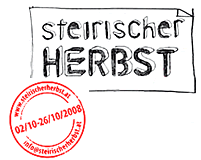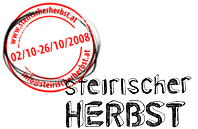 | Strategies for avoiding misfortune
Walking Conference
| 87% theory
13% avoiding misfortune
|

Of course there are the grand, political gestures. But “strategies for avoiding misfortune” are above all concrete practices in social space. A fight waged not on the stage of grand social debates but that rather concerns the immediate living environment. So what everyday practices can be used to pursue the option of acting or not acting?
“Strategies for avoiding misfortune” focuses on a productive attitude that does not abandon the power of a utopia but nevertheless bears feasibility in mind. There is an action between pragmatism and utopia that shapes our everyday life, that creates public spheres and sometimes saves the world a bit.
Divided into various themed walks, the “Walking Conference” strolls around the city and art, looking for and examining “strategies for avoiding misfortune” in talks, lectures and discussions: As a theoretical event that is itself a theoretical strategy.
Starting with a joint lecture to develop the subject, the event then divides up into five walks with different focal topics, converging again at the end with a final panel discussion.
Change of perspective
Walk 1
By Hannes Mayer (GB), Martin Zettel (A) & HDA Haus der Architektur Graz
With Gregor Weiss (A) & VinziWerke Graz
Every day the city surrounds us with its life, and when we are fed up with it, we withdraw into our little houses. But how do people who cannot withdraw see the city?
Guided by a homeless man, we expose ourselves to the eternally public space, hear about personal fates and go to places of aid and security. By inverting the perspective, we make ourselves sensitive to the effects of urban processes and the relative importance of living/housing; we recognise everyday necessities and hone our view for social coexistence in the city.
Co-produced by steirischer herbst & HDA Haus der Architektur Graz
As part of HDA’s programme “Being good together – Can architecture save the world?”
Get the Flash Player to see this player.
Looking for gold
Walk 2
By Dan Belasco Rogers & Sophia New / plan b (D/GB)
With Duncan Speakman (GB)
The Mur (a river that carries gold – even if it’s not enough to risk your life for) divides Graz into east and west, into visited and unvisited, into rich and poor. GPS (Global Positioning System) allows us to determine our exact position anywhere on earth. Two sentences that greatly oversimplify what is in fact a far more complicated reality.
plan b, whose artistic works (including an audio tour at the last steirischer herbst) often focus on walking, examine these claims about cities and new technologies. A walk along the banks and bridges of the river Mur, in search of gold, during which it is proved that you can walk on water.
Get the Flash Player to see this player.
Staying there – going away
Walk 3
By Astrid Kury (A) & Luise Kloos (A)
With Christina Medina (CAN/A), Bertl Mütter (A), Otto Petrovic (A) & Wolfgang Welsch
What voluntary and involuntary social strategies between allying oneself and refusing, between staying there and going away, exist in a time of total mobility and flexibility?
The self-experience tour “Speed Socializing” is a bus trip to places in Graz that allow us to experience the accelerated dynamism and dissolution of near and far at first hand, from virtual globetrotting in Microsoft’s Virtual Earth, powertrain engineering at AVL-List GmbH, to Garbology at the recycling centre of waste disposal company Abfall-, Entsorgungs- und Verwertungs GmbH Graz. The tour is accompanied by theoretical and artistic reflections as to how social networks are organised in a world that has started to move.
Co-produced by steirischer herbst, Akademie Graz & next-Verein für bildende Kunst
With kind support from AVL List GmbH, evolaris Privatstiftung, Grazer Stadtwerke AG, AEVG GmbH Graz & Microsoft Photogrammetry / Vexcel Imaging GmbH
Get the Flash Player to see this player.
Escaping
Walk 4
By Philipp Stöllger (CH)
With Hermann Glettler (A) & Stephan Schaede (D)
Possibilities of escaping from the order of everyday life – these are opportunities for avoiding everyday life that have usually long since become an everyday reality: What counter-worlds haven’t we been to yet? Where, then, do you end up in search of non-everyday excuses, opportunities of transcendence that haven’t already been tried a thousand times?
There is an amazing demand for transcendence: leisure, sexuality, cars, art and similar areas of commerce. Religion is another of these industries. But what happens when you start looking for non-commercial transcendences and horizon-crossings?
Get the Flash Player to see this player.
Thinking
Walk 5
By Michaela Ott (D)
With Isolde Charim (A), Marie-Luise Knott (D) & Nanne Meyer (D)
Thinking is usually regarded as an individual achievement, to which philosophy lays special claim. But in our opinion that thinking always begins with dividual factors. For only by repeating and affirming the dividual does it appear possible to reduce personal calamity. We are field workers walking around Graz, combining dividual methods with image and sound, brush, pencil and other cultural technologies with methods of speech and concept.
Get the Flash Player to see this player.

 |

